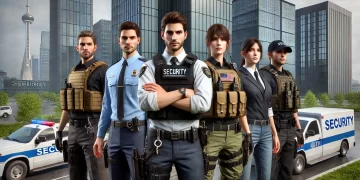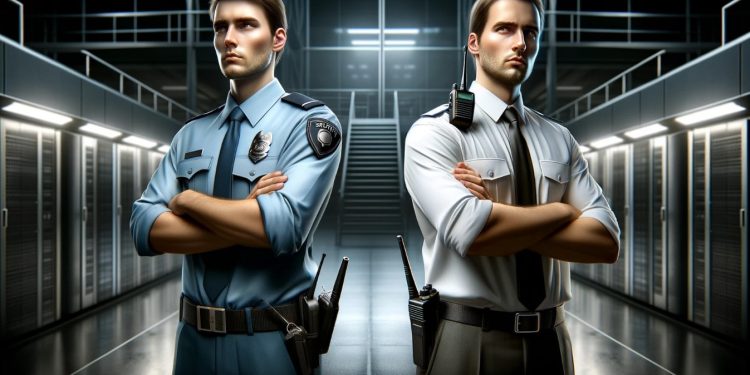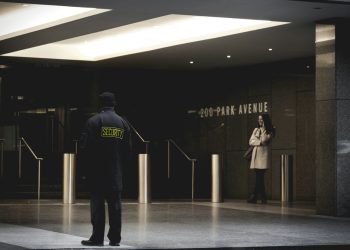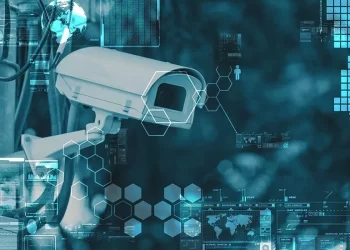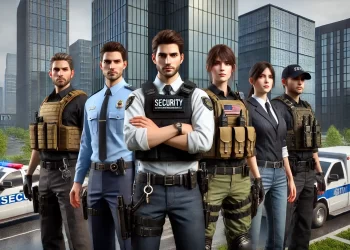In brief, the primary work and duties of security guards and security officers is ultimately to protect people, property and information. Both work together to implement a unified security plan. But the differences between their roles are in their scope of responsibility, training requirements, job demands, and pay.
Security guard vs. security officer- the titles can be confusing, since they are often used interchangeably as if they were the same jobs. Many people see anyone wearing a uniform, with a badge and handcuffs that is NOT a police officer as a security guard or security officer. To the general public there’s no difference between security “guard” or security “officer.”
Some people even use the term peace officer to refer to ANYONE carrying a badge and firearm with the authority to arrest someone. Is a security guard a peace officer? Yes, a peace officer is just a classification used that could include a security guard, police officer, deputy sheriff, state trooper, or a security officer as well!
But to add to the confusion about the differences between security guards and security officers, not all states require a distinction in the terminology or definition of the two roles either. Even some licensing agencies often use the terms interchangeably. However, there really are distinctions between the two roles of security guard and security officer.
Security Guard VS Security Officer
A Security Guard is primarily the frontline security person seen most by clients and the public. Security guards are posted at doors or checkpoints, to guard a gated community or a mall, construction site, venue, or even a person. Security guards patrol premises, respond to alarms, conduct searches, do traffic control, observe CCTV cameras, enforce laws, apprehending suspects, and writing reports. It’s crucial for them to have the right security guards equipment.
A security guard role is relatively stationary, usually “guarding” a specific well-defined spot or area, in a proactive deterrent role against criminal or disruptive behaviors. Security guards follow a security plan given to them by a security officer, and they are only responsible for their assignment location or post.
Security guards are required to have a basic level of education and training. In most states, security guards must have a high school diploma or equivalent as well as completing a state-approved security guard training program. This program teaches them topics such as:
- Legal issues related to security work
- Emergency response procedures
- Communication techniques/customer service skills
- First aid/CPR certification (if applicable)
- Weapons use (if applicable)
- Techniques for foot, car and bike patrol
- Paperwork and reports (e.g. incident reports)
Moreover, some states may require additional certifications or licensing depending on the type of work being performed. While there is no unified national licensing requirement for security guard training, nor is any previous experience necessary, it’s essential to stay informed about the security industry standards to ensure compliance and maintain a high level of professionalism in the field.
Make note that in California, the Bureau of Security and Investigative Services (BSIS) is responsible for licensing and regulating security guards and other security industry personnel. Criteria in CA for getting a license to become a security guard is:
- Being 18 years or older (BPC Section 7582.8)
- Obtaining a criminal history background check (fingerprinting through the FBI and the DOJ- done with the Security Officer Request for Live Scan Service form)
- Meeting all required training (e.g. power to arrest training, 32 hours of skills training within your first 6 months of registration, 8 hours of annual continued training)
- Submitting an initial application
- Online through BreEZe system
- OR a printed form mailed with the application fee to BSIS
- Completing any optional permits and licenses (e.g. firearms, tear gas, or baton permits)
These basic requirements needed to be a security guard in California are very similar to many other state requirements for security guards.
- Security officers are responsible for making and implementing the overall security plans. They know the scope of work needed, and assign duties for security guards to carry out. They are specially trained to assess weaknesses and risk, and develop plans that reduce them.
- A security officer is a field agent with a more active and dynamic role than a guard. A security officer is usually mobile, often providing support to other personnel in the field, performing active checks on guard posts and patrols. Their duties often include training security guards and assigning them tasks to carry out. To effectively manage these responsibilities, it’s crucial for security officers to utilize the latest guard management systems, which help streamline operations and ensure that all security personnel are working efficiently and effectively.
- Officers receive crisis management training- to efficiently manage incidents and make correct decisions under pressure. They are skilled to use weapons and specialized tools. They may be authorized to use force if needed.
- Security officers closely coordinate with local law enforcement agencies or other authorities such as firefighters or medical/ambulance teams. This ensures a smooth consistent security operation with no valuable time lost in which to work with the appropriate contacts.
- Security officers have to handle an increased amount of paperwork and administrative duties. Shift management and communications, detailed reports, notes, incident report handling, private and group communications are just some of their administrative requirements.
- Officers are expected to have a wider range of experience and training, with increased educational and certification requirements. Typically security officers need more education than security guards,due to increased responsibilities. They receive training in advanced security techniques, legal requirements, and weapon skills. They are familiar with the latest state-of-the-art security systems and equipment (e.g. the technology of surveillance drone usage).
In Summary
The primary responsibilities of security guards and security officers are to safeguard people, property, and information. Both roles collaborate to execute a comprehensive security strategy. However, the differences between their roles lie in their scope of responsibility, training requirements, job demands, and pay.





